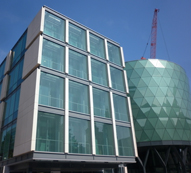A standard for assessing work by universities to look after their students’ safety and well-being has been developed by the University of Salford.
Academics and professional staff from the university with consultancy K7 Compliance have worked with organisations including the British Council and the Security Industry Authority (SIA) to develop the ProtectED code of practice.
The scheme was launched at the annual Association of University Chief Security Officers (AUCSO) 2016 conference, at Salford’s MediaCityUK campus in April. The quality standard covers the work of higher education institutions to ensure the safety, security and well-being of students.
Salford points to figures from the Office of National Statistics that 19 per cent of full time students were victims of crime in 2014-15, compared with 16 per cent of all adults in the general population; while a 2015 National Union of Students survey of more than 1,000 students found that 78 per cent of them had experienced mental health issues in the previous year.
The accreditation scheme is supported by the British Council, Greater Manchester Police, the University Mental Health Advisors Network, and Endsleigh, which specialises in student insurance. It’s designed to show that universities provide the services and structures that enable students to avoid these problems.
It measures what universities are expected to have in place to ensure the safety, security and well-being of students throughout their time at uni.
Universities applying for the ProtectED mark need to sign up to a code of practice. That evaluates the university’s security services besides other measures in place to ensure that students’ psychological well-being is looked after, including international students.
Universities applying for the accreditation will also be expected to work with police and healthcare providers to make sure students’ needs are met and risks managed. It is hoped successful universities could begin displaying the mark as early as the 2016/2017 academic year.
Professor Helen Marshall, Vice Chancellor of the University of Salford, said: “The problem which the higher education sector has grappled with for years is that different institutions have different ways of considering the safety and wellbeing of their students. These are huge issues to students and parents but up until now there has been no standard way of assessing how seriously universities treat them.
“The ProtectED scheme will provide, for the first time, a standard mark which universities can display, demonstrating that they have put the measures in place that a team of independent experts believe should be expected from a 21st century institution. Seeing the ProtectED mark will provide a huge reassurance to any current student and to prospective students looking into which university to attend.
“ProtectED doesn’t just look at security on campus – for too long seen by the sector as our sole concern – it considers the entire student experience, and looks at the wide range of pastoral care for which universities are responsible. I am confident that this code of practice will create a much needed unified approach, while raising standards and improving confidence across all universities.”
Helen Clews, External Relations Adviser for the British Council said: “Personal safety in the UK for students, their dependents, visitors and workers coming to the UK is a duty of care the British Council takes very seriously and we work with partners such as ProtectED to help international students take care of themselves and settle happily into their community.”
Ben Lewis, chairman of AMOSSHE said: “ProtectED in establishing a Code of Practice for the delivery of effective support and security of students, is making explicit the connection between a range of services (Security services, Mental Health Services, Students’ Unions, Student Services).
“This gives real potential for Institutions to think more strategically about how they structure their security and support services, how they work with one another and how they can improve all aspects of the Student experience. AMOSSHE is fully supportive of the work being led by ProtectED and the team at Salford University.”
And Mark Sutton, security manager at Aston University, chairman of AUCSO, said: “The ProtectED code of practice gives a clear opportunity to benchmark processes and procedures that will allow universities to focus on sector best practice, continuous improvement and the student experience. It will raise standards throughout HE and therefore I fully support this excellent initiative.”
Notes
The ProtectED code of practice and accreditation scheme is supported by the Association of University Chief Security Officers (AUCSO), the British Council, the Security Industry Authority (SIA), the Association of Managers of Student Services in Higher Education (AMOSSHE), the University Mental Health Advisors Network (UMHAN), Greater Manchester Police, student insurers Endsleigh, International Professional Security Association (IPSA), National Landlords Association, College & Universities Business Officers (CUBO).










